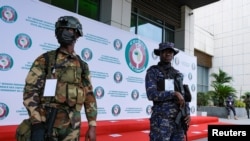Conflict
Burkina Air Raid Kills Dozens

Burkina Faso's army said on Wednesday that civilians had been killed in an air strike against jihadists, as local inhabitants reported around 30 people had died.
In a statement, army headquarters said "targeted actions" were carried out in the east on Monday against "terrorist groups responsible for several atrocities".
"During these operations, which enabled several dozen terrorists to be neutralized, the strikes unfortunately caused collateral victims among the civilian population," it said.
The civilians were close to a jihadist hideout on the Kompienga-Pognoa highway when they were hit by "projectiles", the text said.
It gave no other details, but expressed "sincere condolences" to relatives of the dead and said an inquiry had been launched.
Local residents said around 30 people had died, most of whom were women.
"They had gathered for the inauguration of a mill when the tragedy happened," said one, speaking on condition of anonymity.
Monday's operations were undertaken at Djamanga, Djabiga, Mandeni, Bounou, Obiagou and Pognoa-Sankoado, the army statement said.
The military typically use the term "terrorist" for armed groups behind a ruthless jihadist insurgency.
One of the poorest countries in the world, Burkina Faso first came under attack in 2015 from militants operating in neighbouring Mali.
Since then thousands of people have died, around two million have been displaced and more than a third of the country's territory lies outside government control, according to official figures.
Attacks have increased since the start of the year, despite a coup by colonels whose declared priority is to restore security.
Air raids have been increasingly used against the jihadists in recent months.
The army has previously acknowledged the death of a civilian which it said occurred on June 11 during a strike on armed traffickers in the south. Military prosecutors have opened an inquiry.
See all News Updates of the Day
Africa News Tonight: Hunger, violence stalk Goma residents, US considers AFRICOM changes, Cyclone batters southern Africa
Africa News Tonight: Angola advances DRC talks, Tunisian opposition leaders remain jailed, US firefighters team up with Liberian colleagues
Southern Africa bloc to begin phased withdrawal of troops from DRC
The Southern African Development Community or SADC said Thursday that a summit of regional heads of state had terminated the mandate of its troop deployment in the eastern part of the Democratic Republic of Congo and decided on a "phased withdrawal." SADC lost more than a dozen soldiers in conflict in January. The 16-nation bloc took the decision at a virtual summit on the conflict in the area that has seen some three decades of unrest and claimed millions of lives. "Summit terminated the Mandate of SAMIDRC and directed the commencement of a phased withdrawal of SAMIDRC troops from the DRC," the Southern African bloc said in a communique after the summit. The SADC Mission in the Democratic Republic of Congo, SAMIDRC, — made up of soldiers from Malawi, Tanzania and South Africa — was sent to the region in December 2023 to help the government of the DRC, also a SADC member, restore peace and security. SADC extended its mandate late last year.
Africa News Tonight: DRC, US in talks on trade and security, concerns of civil war risk in South Sudan, tariff talk rattles stock markets
University students resume studies in Bukavu as DRC crisis deepens
University students in Bukavu, in the east of the Democratic Republic of Congo, are gradually returning to class for the first time since M23 rebels took their city last month. Toto Mufungizi, a student, said while they were home “during these months, we have endured many strange things.” “We stayed at home for at least one month and three weeks. We were confined due to this security situation. Even today, there is no serenity, we cannot move around safely," he told Reuters. The M23 rebel group captured Bukavu, South Kivu's capital, in mid-February, forcing a weeks-long suspension of academic activities. The Official University of Bukavu, UOB, and other institutions have now reopened, but security concerns persist. "We are afraid because we heard rumors that in Goma, students were kidnapped. Here, we are also afraid," third-year student Patient Kaliwe said. Some information for this report was provided by Reuters.